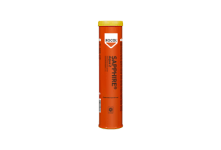Calcium sulphonate complex (CaSuX) greases are renowned for their exceptional extreme pressure (EP) resistance and anti-wear (AW) properties. CaSuX greases, such as SAPPHIRE Dynamic naturally provide superior load-carrying capacity without the need for sulphur-phosphorus additives. This performance is validated through the ASTM D2596 4-Ball Weld Load Test, where CaSuX greases consistently exceed 500 kg weld load, outperforming many conventional and polyurea greases.
Performance Properties of Calcium Sulphonate Greases
1. Why CaSuX Greases Excel in Heavy-Load Applications:
- High Film Strength & Surface Protection
- The natural lubricity of calcite particles in CaSuX greases reduces metal-to-metal contact under extreme loads. This microscopic rolling effect minimises direct wear and extends component life.
- Unlike conventional greases, CaSuX greases maintain structural integrity under high pressure, ensuring consistent lubrication even in shock-load conditions.
- Prevention of Scuffing & Galling
- Under severe pressure, calcite particles fill in microscopic imperfections, forming a self-renewing protective film that prevents surface welding and material transfer.
- This is critical for heavy-duty bearings, gears, and industrial presses, where mechanical stress can degrade conventional greases quickly.
- Resistance to Mechanical Shear & Grease Breakdown
- CaSuX greases offer exceptional mechanical stability, reducing the risk of shear thinning and lubricant migration in events where there is continuous mechanical stress.
- They provide superior protection in heavily loaded bearings, ensuring longevity and reduced downtime.
2. Water Resistance and Corrosion Protection
Water exposure is a leading cause of grease failure, but CaSuX greases deliver exceptional resistance to washout, emulsification and corrosion. Their hydrophobic structure and alkaline nature make them highly effective where humidity, moisture, or direct water contact are a concern.
ASTM Performance Tests & Results
- ASTM D1264 (Water Washout Test):
This test measures how much grease is lost when exposed to continuous water flow at 80 °C. CaSuX greases exhibit mass losses below 2%, meaning they retain almost all their lubricating film even under prolonged water exposure.
2.1 Hydrophobic Grease Structure
Calcium sulphonate thickeners repel water, preventing emulsification and grease degradation. CaSuX greases retain their lubricating properties even in submerged conditions or high-humidity conditions.
2.2 Intrinsic Corrosion Inhibition
The alkaline nature of calcium sulphonate helps neutralise acidic contaminants that might accelerate corrosion. This built-in corrosion protection makes CaSuX greases ideal for applications in marine, food processing, and industrial environments where exposure to water and corrosive chemicals is common.
2.3 Adhesion & Retention on Metal Surfaces
The high adhesion of CaSuX greases ensures that the lubricant stays in place, even under heavy rainfall, water spray, or washdowns. This is particularly beneficial in construction equipment, offshore drilling rigs, and manufacturing plants, where grease loss due to washout is a significant concern.
3. Spherical Roller Bearings and Their Lubrication Needs
Spherical roller bearings (SRBs) are widely used in industrial applications due to their ability to:- Accommodate high radial and axial loads.
- Compensate for shaft misalignment and deflection.
- Provide continuous self-alignment, ensuring stable operation despite operational forces causing shaft bending or mounting inaccuracies.
Due to their durability and versatility, SRBs are often referred to as the “workhorse of the industry.”
3.1 Unique Operating Conditions of SRBs
SRBs exhibit a more pronounced oscillatory rolling motion than conventional bearings, resulting from the interaction between the rolling elements and the raceways.
Due to this SRBs operate with:
- Variable load zones and shifting pressure points – leading to continuous shear forces on the lubricant film
- Constant mechanical stress on the grease, high loads and cyclic movement, creates demanding lubrication conditions, requires a grease with exceptional stability, high load-carrying capacity, and resistance to mechanical degradation.
3.2 Why Calcium Sulphonate Complex (CaSuX) Greases excel in SRBs
- Shear Stability and Mechanical Durability – Shear stability is critical in applications where grease is subjected to constant mechanical stress.
- In the ASTM D217 Worked Penetration Test, calcium sulphonate greases, such as SAPPHIRE Dynamic show minimal change, typically losing less than 20 penetration units after 100,000 strokes.
- In contrast, other greases degrade more significantly, often losing 30 penetration units or more, reducing their effectiveness over time.
3.3 Superior Load-Carrying and Wear Protection
SRBs operate under extreme loads, demanding a grease that can withstand high pressures and reduce metal-to-metal contact.- CaSuX greases possess natural extreme pressure (EP) resistance, providing superior protection against wear.
- Unlike other greases, which may soften or migrate under stress, CaSuX greases maintain their consistency over extended operational periods.
3.4 Moisture Resistance and Corrosion Protection
SRBs are often used in harsh environments such as mining, steel production, and material handling, where moisture exposure is a major concern.
- CaSuX greases exhibit exceptional water resistance, preventing washout and maintaining a protective lubrication layer.
- Their formulation helps reduce the risk of corrosion and premature bearing failure.
3.5 Oxidation Resistance and Long-Term Stability
The chemical composition of CaSuX greases provides a natural defence against oxidative degradation. Key advantages include:- Alkaline Reserve: The presence of excess calcium carbonate (CaCO₃) acts as a buffer, neutralising acidic oxidation byproducts before they accelerate grease breakdown.
- Stable Thickener System: Unlike other greases, where hich may use organic soap-based thickeners may be prone to degradation, CaSuX greases benefit from a highly stable sulphonate structure combined with an overbased calcium carbonate system.
- Oxidation Resistance: Sulphonate functional groups (-SO₃⁻) are inherently more resistant to oxidative attack than the chemical bonds in conventional greases, which can hydrolysze or oxidisze at high temperatures, and remain chemically stable even under prolonged oxygen exposure.
- Reduced Dependency on Additives: Conventional greases often incorporate polymeric stabiliszers that degrade over time, while CaSuX greases rely on inorganic calcium carbonate, ensuring long-term stability by remaining stable regardless of temperature fluctuations or oxidative stress.
3.6 Extended Service Life in High-Temperature and High-Load Applications
Due to their chemical stability, CaSuX greases outperform other complex greases in high-temperature environments:- Maintain oxidative stability for up to 1000 hours under high-pressure oxygen exposure.
- Conventional complex greases typically degrade within 500 hours under the same conditions.
- Prevent varnish or sludge formation, common in greases that break down due to oxidation.
Calcium sulphonate complex greases are an optimal lubrication solution for SRBs, ensuring: - Longer service life through superior oxidation resistance and shear stability.
- Greater wear protection under extreme loads.
- Reliable performance in harsh environments with high moisture and contaminants.
With their unmatched mechanical durability and high-temperature resistance, CaSuX greases such as SAPPHIRE Dynamic provide the reliability and efficiency demanded in heavy industrial applications.




